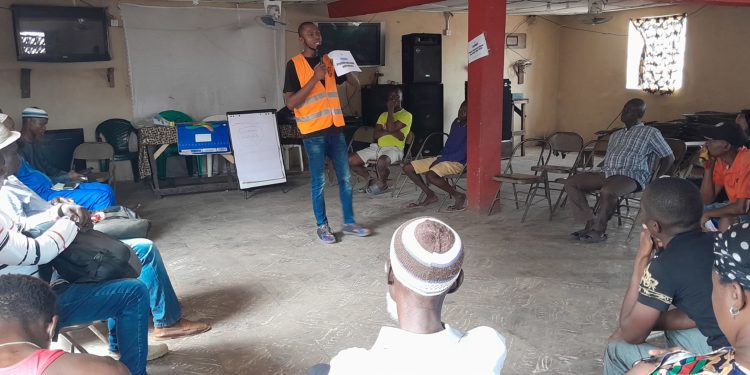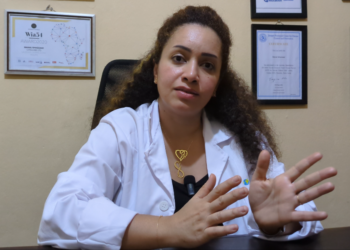Social Workers Sierra Leone (SWSL) on Thursday conducted a community engagement session in Susan’s Bay as part of an initiative to move away from the reactive approach to recurrent disasters in the community.
The organization wants to help stimulate development opportunities that can empower the community people to prevent recurrence of fire outbreaks and flooding.
Susan’s Bay is one of the most disaster-prone areas of the Sierra Leonean capital, Freetown. It is particularly vulnerable to flooding and fire outbreaks, which seem to occur almost every year.
The last major disaster to occur in the community was a fire outbreak, on January 9. At least 50 houses were destroyed, leaving hundreds of people homeless as a result.
SWSL has responded to many of such disasters in the community since 2012, when it was founded. The organization provides mainly psychosocial counseling, but it has also helped raise funds to provide relief supplies as well as educational materials to victims.
Thursday’s engagement was designed in conjunction with one of their partners – the Salone Support Team. Hassan Koroma, National Coordinator of SWSL, said the idea is to end the culture of waiting for disasters to occur and respond with handouts. He said they rather intend to help the community with development initiatives that have lasting impact.
“It’s an open conversation. We want your participation and to share with us your ideas,” Koroma told participants at the start of the session held in the community center, while appealing for their full participation.
He explained further that the idea was to collectively identify the felt needs of the people and to decide on the way to approach the implementation of relevant projects being developed for the community.
The Salone Support Team is a collective of likeminded Sierra Leoneans both in the country and abroad who belong to a Whatsapp group where they discuss development issues about Sierra Leone and raise funds to support needy individuals and communities.
“The funder of this engagement, Trevor Young, is passionate about helping Susan’s Bay but he says he can’t help every individual. He wants to do something that can touch the majority. A project that influences change,” Koroma added.
About 25 community stakeholders, among them the Ward Councilor, Madinatu Kamara and community Chairman, Ismail Kamara, attended the nearly three hour-long interactive session which heard participants recount their experiences dealing with the trauma of recurrent disasters, what they think is responsible and how they believe a permanent solution can be attained.
SWSL, with the support of the Salone Support Team, says it intends to embark on four main project areas – Mental health, Education, Environmental Protection and Youth and Children Empowerment, all of which are crucial to change the situation in Susan’s Bay.
The discussions centered around these issues, and they were designed to identify similar existing programmes and gaps for possible intervention.
Susan’s Bay, which falls under Ward 427, is one of the largest slum communities around the Freetown peninsular.
The Ward representative, Councilor Kamara, confirmed the prevalence of donor fatigue over the recurrence of disasters in the community. She recalled that after the last fire disaster in early January, all of the organizations that previously offered help to victims turned down her appeal for support.
“They said they were tired and that there were many other people elsewhere in the country who are also in need of help,” Kamara said, urging humanitarian organizations not to abandon her people.
She lamented that even officials of the National Disaster Management Agency (NDMA) had vowed that they wouldn’t provide any relief.
“I thought they were joking. And when this happened, I didn’t see any action beyond registration. Up to now we have not seen anything,” she said.
According to Councilor Kamara and many of the participants, the major cause of fire outbreak in the community is poor electricity connection.
“Most fire disasters happen because of poor connections. Sometimes over 50 to 60 people connect to one meter. They contribute to pay for credit. When there is bad light, the chance of fire outbreak is high,” Kamara explained.
According to the community people, while it has failed to provide any support itself, the government ordered NGOs to halt plans to rebuild destroyed homes until they sought out issues preventing regulated construction work.
Binta Bah, Peer Supervisor and Community Health worker, who is also the elected deputy chairperson of Susan’s Bay, said other causes of fire disasters include substandard electrical materials sold in the market. She also said that house owners would rather employ unqualified technicians to cut down on cost of construction, thereby compromising standard.
Also contributing to the seemingly endless fire outbreak, according to the various speakers, include the questionable ways some women cook.
Mrs Bah also cited overcrowding in the community, noting that when fire breaks out, people focus more on protecting their assets, rather than halting the fire.
Joseph Timothy Conteh is the head of the community disaster response committee in Susan’s Bay. He also serves as the Secretary to the Councilor. He said poor environmental practices like dumping in the wrong places have led to flooding. He called on the authorities to provide them gears, regular training and incentives as disaster responders to encourage more volunteerism in the community.






















